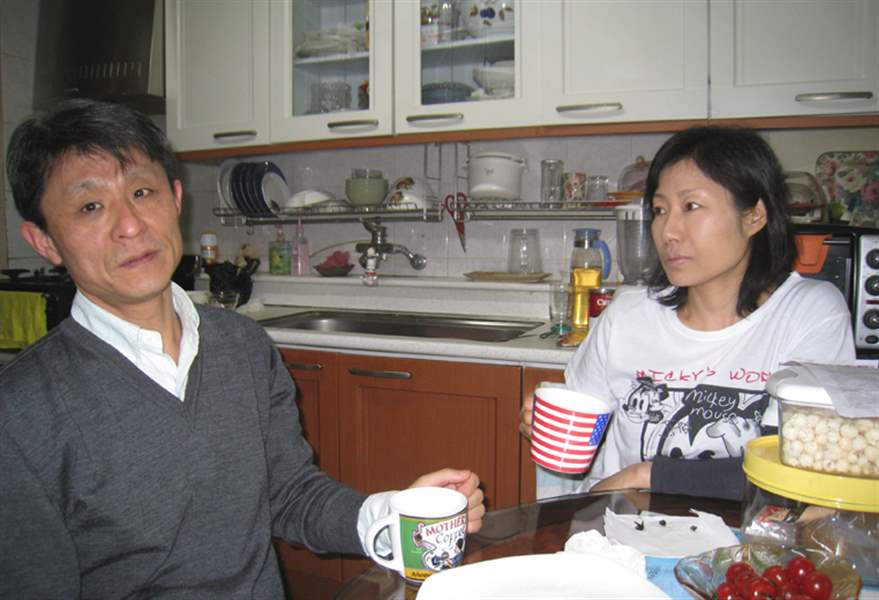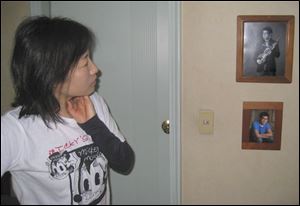
Pain endures for family divided by deportation
5/24/2009
Dae and Young Jung were deported from the United States in 2005 to their native South Korea. Their American-born son, Andrew, stayed behind in Toledo to continue his education.
The Blade/Steve Eder
Buy This Image

Dae and Young Jung were deported from the United States in 2005 to their native South Korea. Their American-born son, Andrew, stayed behind in Toledo to continue his education.
First of two parts
SEOUL - Dae and Young Jung are home. But it sure doesn't feel like it.
Four years ago, U.S. immigration officials deported the Jungs, 20-year residents of Toledo, sending them back to South Korea and separating them from Andrew, their teenage son and an American citizen.
"Sometimes it feels like I'm dreaming that I'm still there," said Young Jung during an interview at Dunkin Donuts in downtown Seoul, one of the largest cities in the world. "Everybody says it is not fair."
It's been a struggle for the Jungs since immigration officials ushered them to an airport on Aug. 12, 2005, sending them off to Seoul and banning them from returning to the United States for 10 years. In a series of interviews with The Blade in Seoul, the Jungs described how they feel as if they are foreigners in their homeland, unfairly banished from a country they had come to call their own and separated by an ocean from their only child.
For the Jungs, the past four years - since immigration officers knocked on their door in the early morning of Valentine's Day, 2005 - have been a nightmare that won't end. They miss their son, they miss their friends, and they miss the calmness of Toledo that can't be found in a bustling city such as Seoul.
"Sometimes I wake up in the middle of the night and I'm dreaming about working at the library with a bunch of kids around me," said Mrs. Jung, who often volunteered at local libraries and at her son's school. "I never dreamed I would be in a situation like this."

Young Jung gazes at pictures of Andrew in the couple s apartment near Seoul. The Jungs use a computer to stay in touch with their son, a high school senior in Toledo.
The Jungs' story has played out in slow motion during nearly 25 years. Even though four years have passed since their deportation, they recall each step of their struggle in excruciating detail.
"In any country, if you put your life there for 20 years, you are part of it - like us," Mr. Jung said.
In 1984, the newly married Jungs came to Toledo and Mr. Jung received a student visa to study at the University of Toledo, where he later received his degree in mechanical engineering. Except for a nine-month period in 1995, the Jungs lived in Toledo until their deportation in 2005.
In 1995, the Immigration and Naturalization Service declared the Jungs illegal aliens after Mr. Jung changed his plans to continue his English language education at a Michigan school. A year later, the INS issued deportation orders for the Jungs because they failed to show up for a deportation hearing. The couple continued to live in the Toledo.
The couple later said they never received notice of the hearing, but a panel of federal judges said it was up to the Jungs to notify the government of any changes in their address.
With the deportation orders still standing, Mr. Jung in 2000 obtained a work permit from the government so he could be a sushi chef.
In February, 2005, immigration officials knocked on the door of their West Toledo apartment and arrested the Jungs. Mr. Jung was released to care for Andrew, but Mrs. Jung spent six months in 11 jails before the couple was deported.
"Every time someone bangs on my apartment in Korea, that moment flashes through my mind," Mrs. Jung said.
In Korea, the Jungs live in a 1,000-square-foot, three-bedroom apartment owned by Mr. Jung's brother in a high-rise building in Gwang Myeong, a city on the outskirts of Seoul. Andrew, now a senior at Emmanuel Baptist High School in Toledo who lives with friends of his parents, spent his junior year in the apartment with his parents.
Andrew, who does not speak the Korean language, was home-schooled during that time.
Their windows overlook huge construction sites where towering buildings are being built with a mountain in the background. Inside their home, the walls are covered with pictures of Andrew, his award certificates, and photos of their American friends.
Mrs. Jung has an envelope packed with a letter she received while she was in a U.S. prison. Mr. Jung keeps a binder of all of the family's important documentation stemming from the family's struggle with the U.S. government.
The center of the home is the family's computer, which they use to communicate with Andrew. The background of the computer screen is a photograph that Andrew took with U.S. Sen. Ted Kennedy. Andrew met the Massachusetts Democrat and other important figures when he traveled the United States a couple years ago on an immigration reform tour on behalf of his parents.
Even in Korea, the Jungs can shop and eat at many of the same restaurants, like Pizza Huts and KFC, and stores such as Costco that are found in Toledo.
But still, "it is very hard to find someone you can talk to in English," Mr. Jung said.
Even though Mr. Jung is a trained sushi chef, has a degree in mechanical engineering, and speaks fluent English, he's struggled to find work because he lacks a network in Korea and because he's 50 years old, a tough age to find a job in that nation's tight job market.
"Because of the economic trouble, I'm virtually not making anything in the last six months," Mr. Jung said.
In the meantime, the Jungs are living off an inheritance, but they have dreams of one day opening their own restaurant.
"The only way I can use my skill is to open my restaurant, but it takes a lot of money," Mr. Jung said.
Through all of the struggles they've faced, the Jungs say their resolve has strengthened and they've learned that they depend more on each other than ever before, especially as they try to build a new life in Korea without their American friends who became their family in Toledo.
Their marriage, they say, was strengthened before they were deported, when Mrs. Jung was jailed.
"We are still missing everything we have experienced in Toledo," Mr. Jung said. "The last six months weren't pleasant, but we learned something. I got to understand that I need her more than I thought I would. Family should stay together all of the time."
Despite the protests of American friends and politicians, including U.S. Rep. Marcy Kaptur (D., Toledo), the Jung family isn't together and unless the federal immigration service has a change of heart or immigration law changes, the Jungs won't be reunited in Toledo with their son for at least six more years.
That's the hardest part - being separated from Andrew, who they left behind in the United States so he wouldn't have to learn a new language and a new culture as a teenager.
"That's why I cry a lot," Mrs. Jung said. "When a special occasion comes, it is tough. He is my dream and he is my only son."
Contact Steve Eder at:
seder@theblade.com